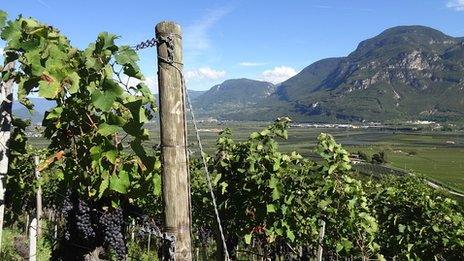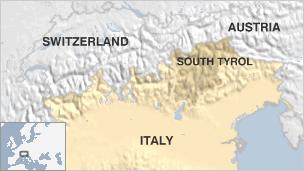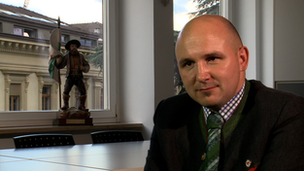Euro crisis turns German-speaking Italians against Rome
- Published

Largely German-speaking South Tyrol has been part of Italy since the end of World War I
In the vineyards of South Tyrol's Alpine valleys, the grape harvest is under way.
Alois Lageder's family have made wine here for five generations, but when some of the vines were planted, this region was part of Austria.
And most people here speak German, even though it has been part of Italy since the end of World War I.
Mr Lageder says the mix of cultures is an asset.
"We are Austrians, we were Austrians 100 years ago and so we have the Austrian culture, but also the Austrian or German mentality and approach to work," he said.

Local wine maker Alois Lageder believes South Tyrol's people are Austrians at heart
"But I think we are lucky because living here in the middle between north and south, we are not too strong or too straight. I think this is our big advantage, that we understand the Italian mentality but we understand the mentality of our big markets like Austria and Germany and Switzerland."
South Tyrol is Italy's richest province, a largely German-speaking part of the country that has autonomous status. Its Italian name is Alto Adige.
But now the euro crisis means the Italian government wants to cash in. It is asking the regional government here to pay more, fuelling resentment of Rome and raising the spectre of separatism.
Tensions
German speakers are the local majority in South Tyrol - but native Italian speakers live here too. Relations between the two groups have not always been easy.

The journalist and author Lucio Giudiceandrea says before the region was granted autonomy in the 1970s, tensions sometimes ran to violence.
"Germans and Italians lived for many years in conflict with each other because South Tyrol was annexed to Italy at the end of World War I against the will of the local German-speaking population. The Italians were sent here as colonisers and there is a longstanding hostility between the groups," he said.
"The autonomy system [set up in the 1970s] gave us the chance to live side by side, but with no great contacts."
Over the years, tensions have eased. Being bilingual is now an accepted fact of life; members of Italy's national police, the Carabinieri, are regularly sent to brush up their German at the Alpha Beta Piccadilly language school in Bolzano.
But these days, Italy's financial problems are reawakening old resentments.
Tax gripes
Walking through the affluent streets of Bolzano, with its quaint Tyrolean architecture, it is easy to come away with the impression that South Tyrol is remarkably untouched by the euro crisis.
Unemployment is low and business is thriving. But, as in other wealthy parts of Europe, many German speakers here resent having to bail out southern Italians - whom they see as spendthrift and profligate.
Elmar Thaler, Federation, Historic S Tyrolean Riflemen: 'People are asking why we should have to pay for Italy. We are not actually Italians anyway. '
Up to now, 90% of taxes paid here stayed here. But the government in Rome needs cash, and wants more money from South Tyrol.
Siegfried Brugger, an MP from the governing South Tyrolean Peoples' party, says that goes against their autonomy agreement. But he says they are willing to negotiate.
"We have a lot of problems because we have to give a lot of money to Rome," he said. "But we want to decide ourselves how and where to save and for us it is very important to collaborate with Italy and not to give money without a guarantee."
And some people want to leave Italy altogether. The 500-year-old group, the Suedtiroler Schuetzenbund, (the Federation of Historic South Tyrolean Riflemen,) has long campaigned for reunification with North Tyrol, which is part of Austria.
Separatism calls
In April, the group organised a protest in Bolzano demanding freedom from Rome. It was attended by around 5,000 men and women in lederhosen and traditional dress. The Schuetzen's leader, Elmar Thaler, says the worse things get economically, the better it is for their cause.

Elmar Thaler says South Tyrol should separate completely from Rome.
"People are asking why should we have to pay for Italy?" he asked. "We aren't actually Italian anyway. In this way, the crisis has made many people aware that they haven't got anything to do with Italy."
This is a minority view. Separatism is not the hot political issue that it is in the Spanish province of Catalonia, and the Schuetzen say they are not linked to other Italian separatist movements, like the Northern League.
But Siegfried Brugger says many politicians in South Tyrol are watching developments in places like the Basque Country and Scotland very closely.
Lucio Giudiceandrea says the region is at a turning point.
"The situation in Italy and all over Europe is no longer certain and the money is no longer freely available," he said.
"I think we have to learn to live with the other group and to see each other not as rivals but as friends. If we don't, for sure we will fall into conflicts. And of course this situation depends only on us."
On a sunny day in Bolzano, the cafes do a roaring trade in cappuccino, as a street musician in a Tyrolean hat with a feather plays that most Austrian of tunes, the Blue Danube. The financial crisis is testing Europe's historic fault-lines.